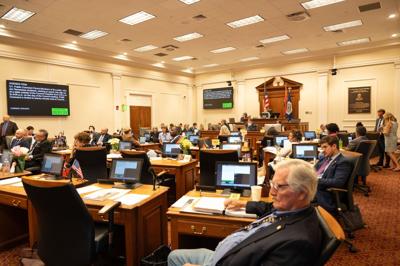The Metro Council is set to consider a set of bills aiming to address Nashville’s housing crisis at a meeting on Nov. 4. The legislation stems from a Metro housing study that found Davidson County needs approximately 90,000 additional units in the next 10 years to keep up with demand.
“We did find that in our zoning code there are some barriers to housing production,” Metro Planning Department deputy executive director Lisa Milligan tells Scene sister publication the Nashville Post.
Housing diversity is seen as key to alleviating catastrophic home prices
“What we have found is that our zoning code is really good at producing single-family housing and really large-scale multifamily housing," she says. "And there's a whole lot of stuff there in the middle that our code is not as good at producing in a good design. And that's things like townhomes, quadplexes, smaller multifamily. Our code just is missing some things. There's some gap.”
The set of four proposed bills looks to update the city’s code. One of those, BL2025-1006, would regulate the height of certain buildings within single-family residential and two-family residential zones to roughly two-and-a-half stories. Milligan says this could help reduce what have become known as “tall-and-skinny" developments and address community concerns that zoning changes will impact neighborhood character.
Another bill, BL2025-1007, would expand options for detached accessory dwelling units, also known as DADUs, like garage apartments and in-law suites. The bill would allow DADUs in areas of the Urban Services District and allow for a DADU overlay in the General Services District. Under the bill, DADUs are not permitted to be taller than the main home.
Milligan says she's heard citizen concerns that DADU expansion could cause stress on the stormwater infrastructure, but she does not foresee this being an issue with the current proposal.
“All development, anything that's newly built, has to meet all of our adopted stormwater regulations," she says. "[It] has to go through the review process and ensure that they meet all of those standards."
A Metro infrastructure study is currently underway, with the findings set to be released in the coming months. Some opponents of the proposed zoning have pushed for the council to wait until the findings are released before moving forward with the bills. Milligan maintains that the current bills do not have a large impact on the city’s current infrastructure.
An additional proposal, BL2025-1008, would establish a voluntary housing incentive program, permitted by a 2024 state law. The program would apply to multifamily developments and require participating developers to designate a portion of the property as attainable housing for 30 years. The developers would then be eligible for incentives like height allowances and reduced parking minimums.
Another ordinance, BL2025-1005, is among the most highly contested in the current zoning debate. The bill would create two new zoning districts: residential neighborhood and residential limited. The districts would make it easier to build housing units like townhomes, courtyards, low-rise flats, triplexes and quadplexes. If passed, the bill would not automatically apply the districts throughout the city but would rather give councilmembers the option of proposing the change for their districts.
“It has to go through the same rezoning process that exists now,” Milligan says. “Nothing about these bills changes that process. And so it would still have to go through a planning commission process and a council process.”
Dedicated property fees could make Division Street and Demonbreun Hill cleaner and more expensive
All four bills are currently slated to be considered on second reading, accompanied by a public hearing at the council’s Nov. 4 meeting. However, Milligan says BL2025-1006, which focuses on height regulations, is likely to be deferred because the Metro Planning Commission has not yet made its recommendation.
Overall, Milligan says the planning department sees the zoning reform as an improvement and a way of bringing the city’s code up to modern standards.
“Whether or not our city is growing as quickly as we think it is, or whether it's growing more slowly, we still think it's important for our code to be improved,” she says.
“These are important changes regardless of that. These are changes that improve the design quality, provide more predictability and give more options. And we think that those are really important things to do for the city overall. These bills just help to set our rule book in a better position.”
This article was first published by our sister publication, the Nashville Post.







